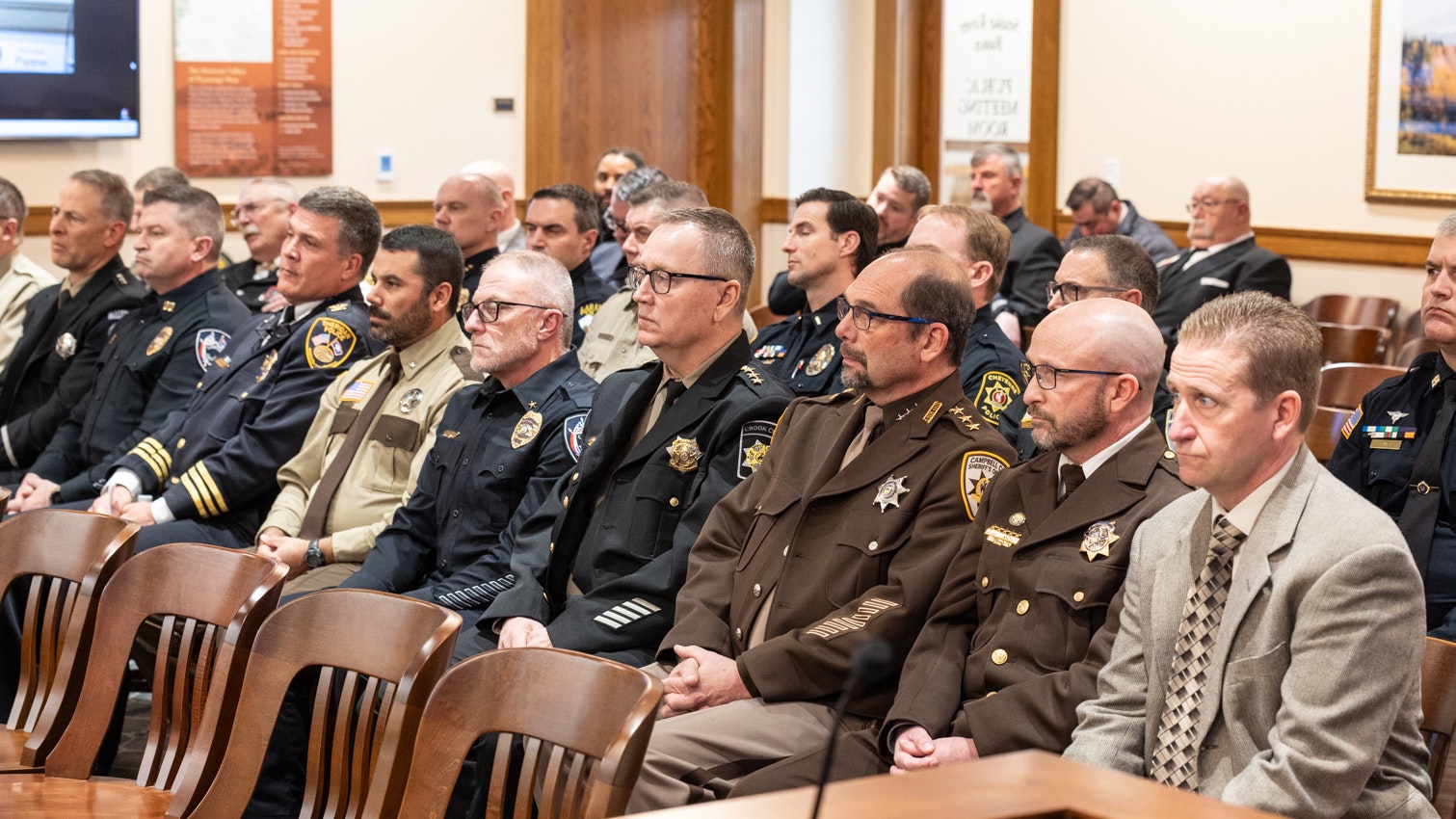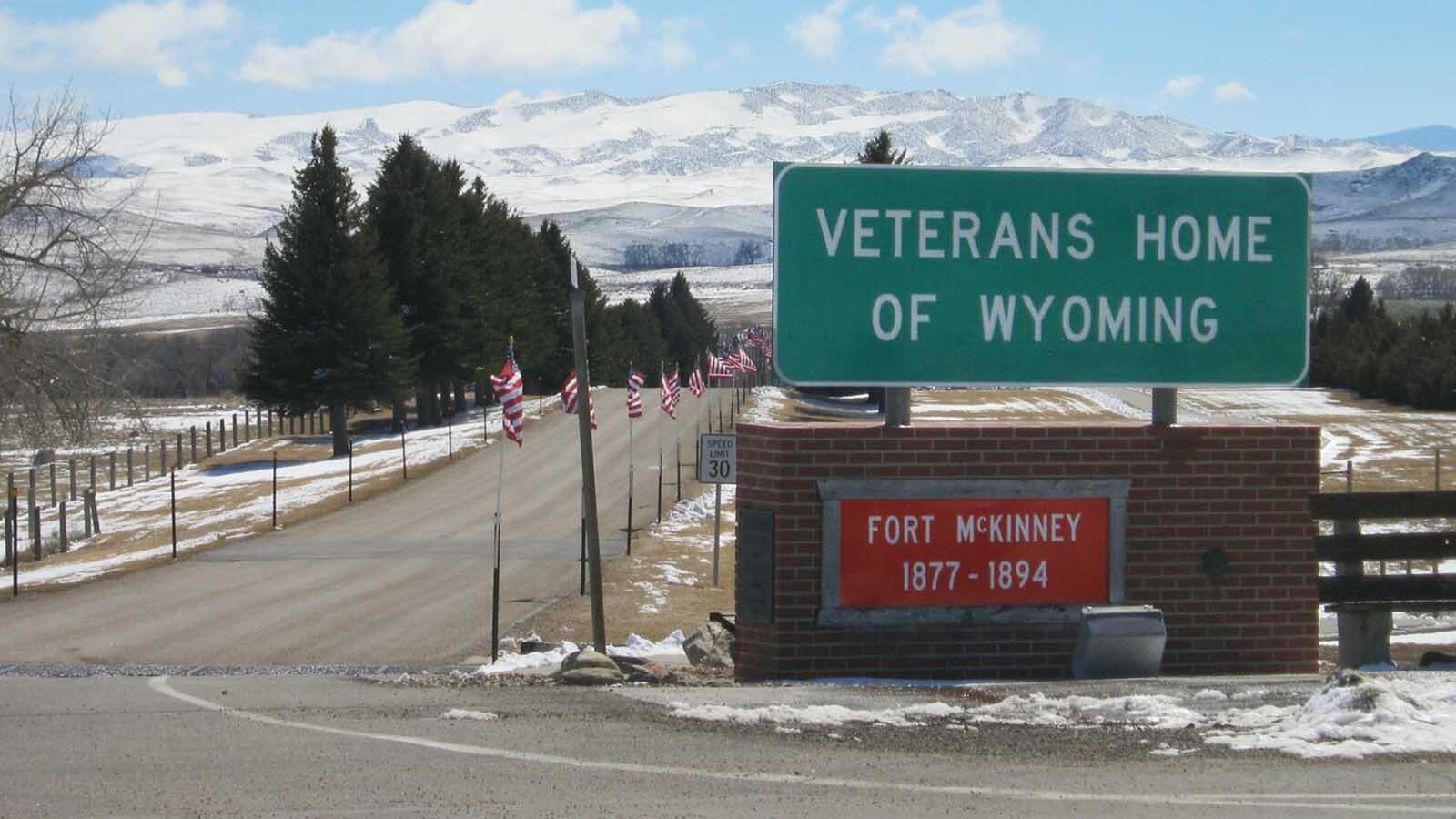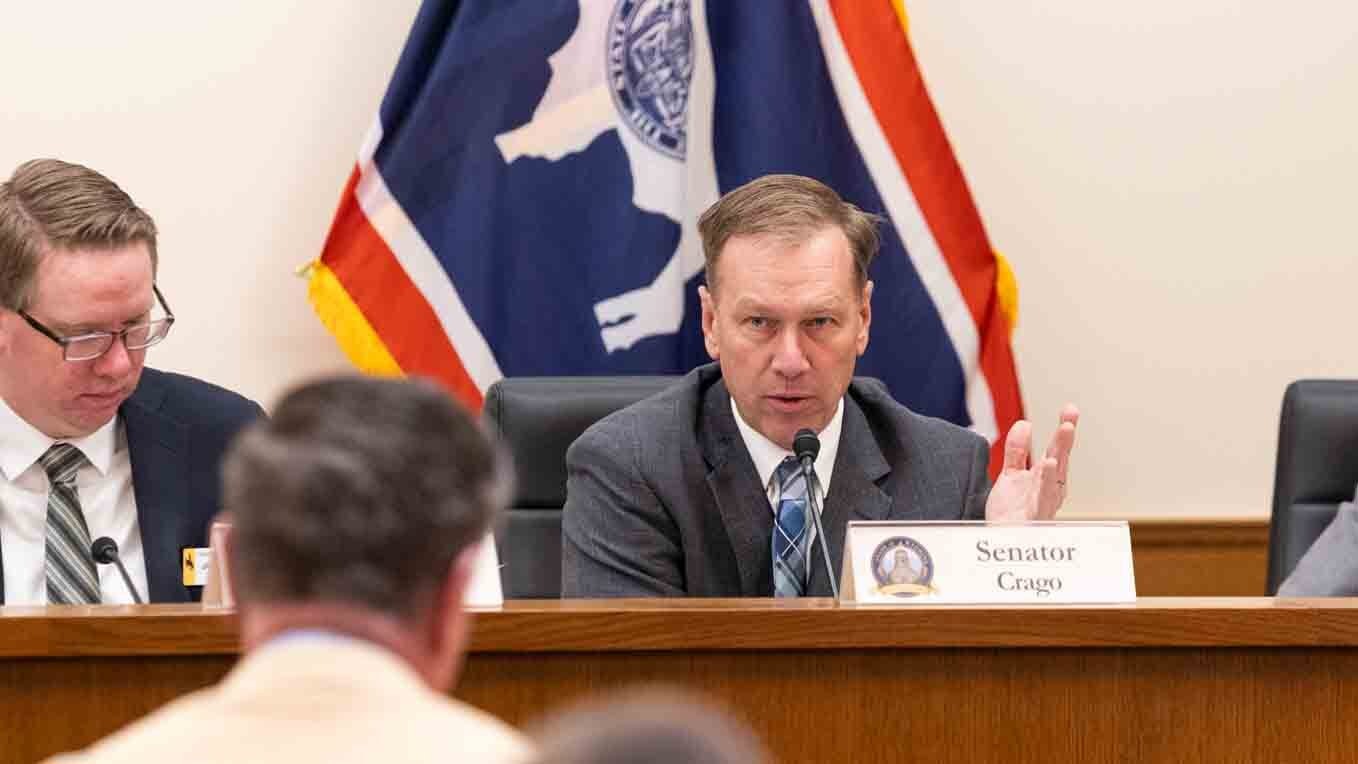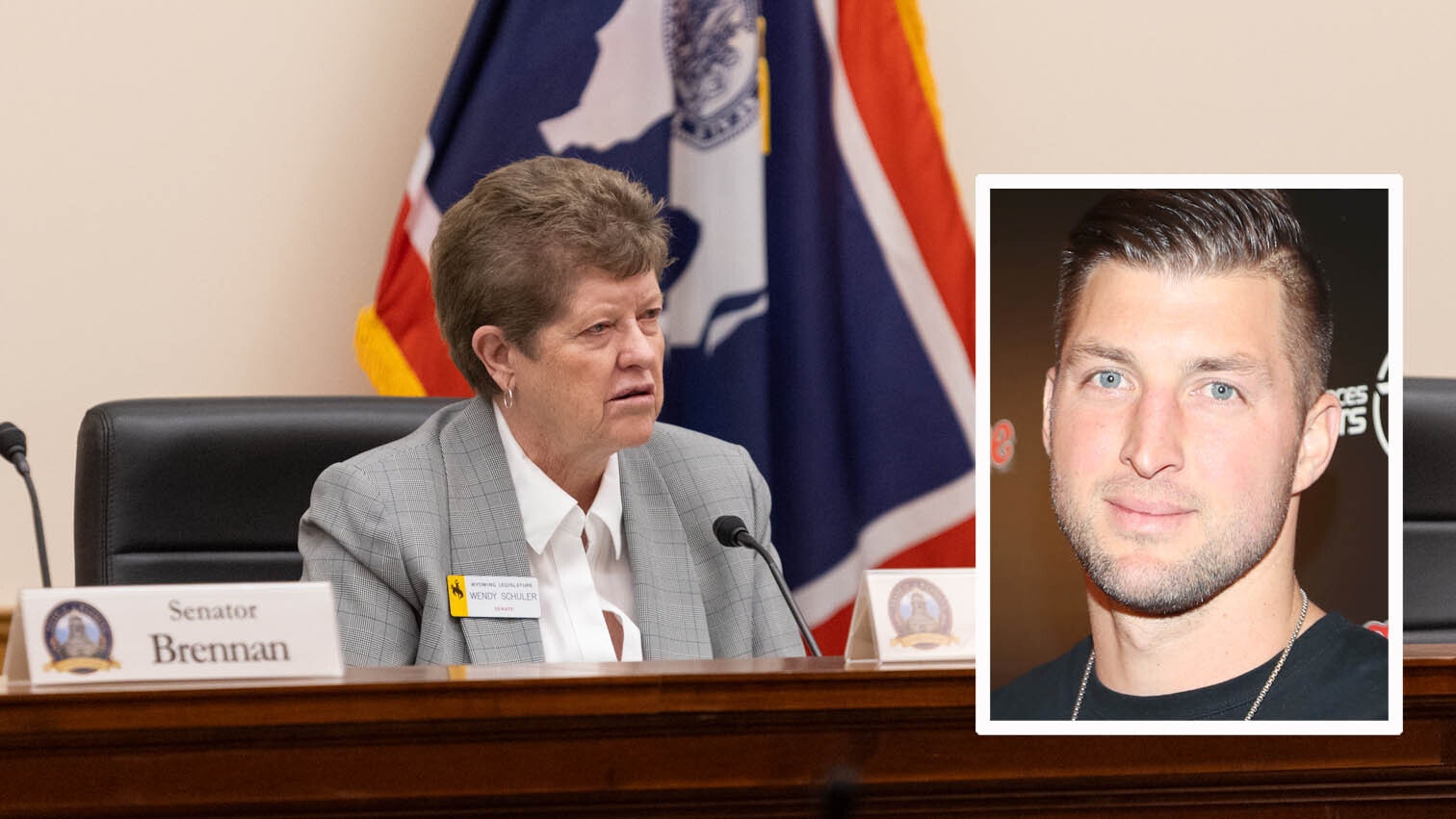The Wyoming Freedom Caucus on Thursday evening officially joined the debate about whether the state should add more nuclear waste sites within its borders – voicing stark opposition.
The move pits the state Freedom Caucus against a handful of non-Caucus Republican lawmakers, and the Libertarian Party of Wyoming. It also follows President Donald Trump's announcement of his overarching nuclear-production agenda.
The Wyoming Freedom Caucus is a group of Republican state lawmakers invoking many themes of the New Right. Some lawmakers aligned with it have for weeks criticized proposed Wyoming legislation that could add more spent nuclear fuel storage sites in the state if passed.
But Thursday evening marked the first official statement on the matter from the group as a whole.
“Wyoming must continue to be a leader in proven energy production, not settle as a dumping ground for nuclear waste from other states,” says a statement the caucus released Thursday evening. “California billionaires insist on saddling our landscapes with their windmills, their solar panels and now their radioactive casks.”
Radiant Industries, a microreactor builder and one of potentially multiple companies to eye Wyoming’s business landscape, is based in California.
The company did not respond by publication time on Friday to an email request for comment.
“We support homegrown energy,” continued the WFC statement, “not out-of-state waste subsidized to the tune of $25 million in taxpayer dollars.”
Trump's plan to fast-track nuclear production acknowledges that nuclear waste storage is an indispensable corollary of that agenda.
As part of that, Trump in May called for a 240-day study on nuclear waste storage, which the WFC lauded as an example of “thoughtful guidance on nuclear” because it “acknowledges that the treatment of nuclear waste is one of the most difficult problems in the nuclear supply chain.”
The Freedom Caucus said Wyoming should, similarly, slow down its own approach to the issue.
The 2026 Wyoming lawmaking session begins in 198 days. If it passes, the proposed legislation could multiply nuclear waste storage sites across the state.
State law already allows temporary, high-level radioactive waste storage facilities within its borders.
In the months preceding the session, which starts Feb. 9, the question is whether to also let reactor manufacturers maintain waste facilities in-state.
Called It
From reviewing posts by individuals generally aligned with the Wyoming Freedom Caucus, like Rep. Nina Webber, R-Cody, the Libertarian Party of Wyoming concluded even before WFC’s statement that the group would galvanize against the proposed legislation.
The Libertarian Party guessed correctly.
“The Wyoming Libertarian Party is committed to free markets and free people,” says a statement the party’s board sent Wednesday via social media. “The Wyoming Freedom Caucus believes in big government and big regulation! We were the first to call them out on their anti-energy, anti-Wyoming nuclear stance, and we will be in their districts reminding their constituents that when there was an opportunity for economic diversity and energy dominance, the Freedom Caucus was sharing left-wing nuclear fear mongers.”
That was a reference to Webber posting a video featuring environmentalist Gary Headrick, cautioning of nuclear waste hazards.
Webber did not respond to a Wednesday email request for comment, which she told Cowboy State Daily to send during a brief phone call.
She is not listed in the group’s official roster, though she generally aligns with it on legislative matters.
The Libertarian Party of Wyoming concluded: “It’s time for the Republican Party to boot the Freedom Caucus before their socialist policies do irreparable damage to our state.”
In The Works For Years
Rep. Lloyd Larsen, R-Lander, told Cowboy State Daily that detractors’ fears about multiplying the storage sites are overblown. The state has been preparing for nuclear market installments for years, as it’s geared up for the building of a TerraPower nuclear power plant in Kemmerer first announced in 2021.
Other states are eager to edge into the market as well, said Larsen, adding that Wyoming should act fast.
“Slowing down will be detrimental to the state. Because if you look at Texas spending billions of dollars to recruit nuclear. Tennessee… wants these companies. Utah has opened its doors,” said Larsen. “But we’re out ahead of them; and now we’re wanting to put on the brakes? Big mistake.”
Homegrown, Actually, Says Longtime Lawmaker
Larsen noted that the proposed law would require the waste sites’ corresponding nuclear reactors sit in Wyoming. Other parts of nuclear materials’ production life cycles would also happen in Wyoming, he said.
He also countered points Rep. Reuben Tarver, R-Gillette, voiced Wednesday to Cowboy State Daily, in which the lawmaker urged Wyoming to slow down to ensure that, should the U.S. Nuclear Regulatory Commission (NRC) ever permit an operator under circumstances Wyomingites dispute, the state can maintain legal grounds to challenge that.
The current and proposed laws together maintain those grounds already, said Larsen.
The proposed bill would place the new spent-fuel storage facilities under the purview of the Industrial Development Information and Siting Act already in Wyoming law. It would require the Wyoming Department of Environmental Quality to review the company’s financial assurance for decommissioning a defunct installment, among other facets of the plan. It would require the DEQ to update lawmakers on the results of those reviews.
Any spent fuel abandoned by the private company would revert not to Wyoming’s responsibility, but to the U.S. Department of Energy’s purview, said Larsen, adding that the NRC’s permitting process is another standalone process that companies would have to survive.
As to whether Wyoming would maintain both standing to challenge bad actors and robust safety framework under the proposed and current legal language, the answer is "Absolutely," in Larsen's view.
Dry cask spent-fuel storage, like those contemplated for Wyoming, must withstand “credible natural disasters and accidents,” to survive the permitting phase, according to the NRC. “The NRC staff also conducts quality assurance inspections of vendors who design and manufacture the storage systems and operating spent fuel storage facilities to ensure compliance with the NRC's safety requirements.”
We Aren't A Loophole
Rep. Kevin Campbell, R-Glenrock, opined this week in a Cowboy State Daily guest column that Wyoming shouldn’t tweak its laws to pave the way for a California startup company presenting potentially high-risk plans.
“Wyoming is not a dumping ground,” wrote Campbell. “We are not a regulatory loophole. And we are not so desperate for jobs or headlines that we should compromise our long-term safety and sovereignty.
“We can be national leaders without being nuclear guinea pigs,” he continued. “If we rewrite our rules every time a venture-backed company from Silicon Valley knocks on our door, we are not leading — we’re being played.”
Radiant could be the mere start of a proliferation of nuclear waste sites, he added.
Campbell pointed not just to what he calls risks of storing the waste but also risks of transporting it.
Since The '40s
Larsen countered, saying current laws, technology and regulations all address that.
“The planning for transportation is extensive,” he said. “To suggest that the NRC and the Department of Energy is not concerned about that… I can’t get my head around how we’d come to that conclusion.”
Larsen also disputed some detractors’ hesitation to embrace nuclear energy because Wyoming has long relied on coal for both infrastructure and economic benefit.
He questioned where those detractors were when natural gas burgeoned in the energy market, or during earlier Wyoming uranium booms.
“Why do we do that with nuclear, when uranium mining has been one of our foundational industries in this state since the late ‘40s?” he asked. “When they talk about picking winners and losers, that’s what I hear some of this effort to be. Because it didn’t bother them when natural gas was taking over.
“I just think, we love ‘em all,” he added. “And there’s room for nuclear.”
The Outcry
Numerous Bar Nunn residents in June opposed Radiant's plan to build a spent fuel acility near the town.
Natrona County Commissioners, in turn, supported the company's application for $25 million in state money for the build.
Republican State Rep. Bill Allemand, who represents Bar Nunn, delivered a blistering critique of the project, telling commissioners before they gave their support Tuesday that his constituents overwhelmingly oppose it.
"There's a huge pushback," Allemand said, describing a recent Radiant town hall where of the "25 people there, 23 of these people were extremely against it."
Allemand argued there is "no benefit for the state of Wyoming, for Natrona County or for Bar Nunn" because initial sales would go to the U.S. Department of Defense, which doesn't pay sales tax, and manufacturing taxes are exempt until 2042.
"It takes 72 years with no interest to pay that $25 million back," Allemand said, challenging Radiant's job projections.
He estimated the company would employ closer to 100 people rather than the promised 250, making the cost “$250,000 per job ... The people of Bar Nunn do not want this in their backyard."
Clair McFarland can be reached at clair@cowboystatedaily.com.





